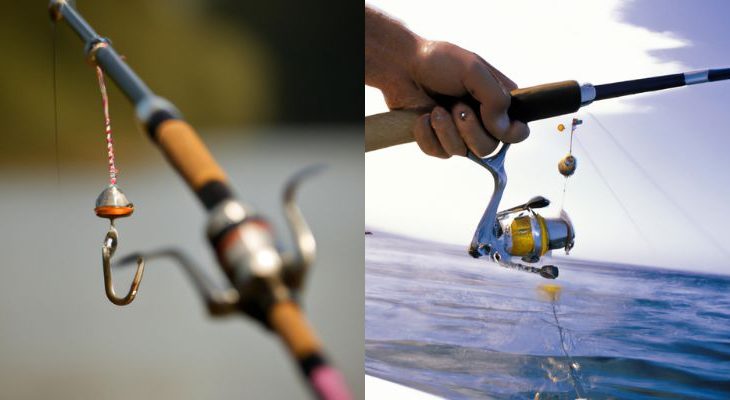Last updated on February 14th, 2024 at 11:45 am
Last updated on February 14th, 2024
Fishing is a great way to relax and enjoy the outdoors. It can also be a fun and rewarding activity that you can enjoy for a lifetime. However, getting started can be daunting for beginners.
In this article, we will provide a step-by-step guide on how to turn fishing into a lifestyle that you can enjoy for years to come. We will cover the following topics:
Setting Realistic Goals, Getting the Right Gear and Equipment, Learning the Techniques and Terminology, Joining a Fishing Community, Planning Your Trips and Outings, and Incorporating Fishing into Your Everyday Life
I. Start by Setting Realistic Goals
A. Why Setting Goals is Important
Setting goals is important in any endeavor, including fishing. It provides a sense of direction and motivation, as well as a way to measure your progress. Your goals should be specific, measurable, and achievable. For example, you may want to catch a certain number or size of fish, or learn a new technique.
B. What Kind of Goals Should You Set?
Your goals should be tailored to your personal interests and skill level. They should challenge you, but also be achievable. For example, if you are a beginner, you may want to set a goal to catch your first fish. If you are more experienced, you may want to set a goal to catch a certain species of fish, or improve your casting distance.
C. How to Track Your Progress
Keep track of your progress by taking notes or photos of your catches, and keeping a record of your achievements. This will help you stay motivated and see how far you have come.
II. Get the Right Gear and Equipment
A. Basic Equipment You’ll Need
To get started with fishing, you will need basic equipment such as a fishing rod, reel, line, and bait. You may also want to invest in a tackle box to keep your gear organized and easily accessible.
B. Choosing the Right Rod and Reel
Choosing the right rod and reel can make a big difference in your fishing experience. There are many types of rods and reels to choose from, depending on the type of fishing you will be doing. Do your research and consider your personal preferences, budget, and skill level when making your selection.
C. Other Accessories to Consider
There are many other accessories that you may find useful when fishing, such as fishing lines, hooks, sinkers, lures, and more. Do your research and consider what will work best for the type of fishing you will be doing.
III. Learn the Techniques and Terminology
A. Types of Fishing Techniques
There are many types of fishing techniques, such as fly fishing, baitcasting, spin casting, and trolling. Each technique requires a different approach, gear, and skill set. Do your research and practice different techniques to find what works best for you.
B. Common Fishing Terms You Need to Know
There are many terms and phrases used in fishing that may be unfamiliar to beginners. Some common terms include casting, trolling, bait, lure, and hook. Learning these terms will help you communicate with other anglers and understand fishing-related resources.
C. Resources for Learning More
There are many resources available to help you learn more about fishing, such as books, videos, online tutorials, and local fishing classes. Take advantage of these resources to improve your skills and knowledge.
IV. Join a Fishing Community
A. Benefits of Joining a Fishing Community
Joining a fishing community can provide many benefits, such as access to new fishing spots, learning from experienced anglers, and socializing with like-minded individuals. It can also help you stay motivated and inspired.
B. Where to Find Local Groups and Clubs
If you’re looking to get involved in the fishing community and connect with other anglers, one of the best ways to do so is by joining a local fishing group or club. These organizations can provide a wealth of resources and support, as well as opportunities to meet new people, learn new techniques, and explore new fishing spots.
So where can you find local fishing groups and clubs? Here are a few tips to get you started:
Ask at your local fishing store: Many fishing stores are connected with local groups and clubs and may be able to provide you with information or even put you in touch with someone who can help.
Check online directories: Several online directories and databases can help you find local fishing clubs and groups in your area. A simple Google search can bring up a variety of options to choose from.
Reach out to state or regional fishing organizations: Many states and regions have their fishing organizations, which can be a great resource for connecting with local groups and clubs. These organizations often have websites or directories that list affiliated groups and clubs.
Ask other anglers: If you’ve already met some other anglers in your area, don’t be afraid to ask them if they know of any local fishing groups or clubs. Word of mouth can be a powerful tool for finding new connections and resources.
When you do find a local fishing group or club that interests you, be sure to reach out and get involved. Attend meetings and events, ask questions, and offer to help out with club activities or initiatives. By getting involved and building relationships with other anglers in your community, you can truly immerse yourself in the fishing lifestyle and make it a part of who you are.
V. Incorporate Fishing into Your Everyday Life
Fishing can be much more than just a weekend hobby or occasional pastime. If you truly want to live and breathe fishing, it’s important to find ways to incorporate it into your everyday life. Here are some tips for doing just that:
Making Time for Fishing: One of the biggest obstacles to incorporating fishing into your daily routine is finding the time to do it. If you have a flexible work schedule, you might consider taking a half-day or even a full day off each week to spend on the water. Alternatively, you could try to find ways to combine fishing with other activities that you already do regularly, such as hiking, camping, or even exercising.
Finding Local Opportunities: Depending on where you live, there may be plenty of local opportunities to fish close to home. Consider checking out nearby lakes, rivers, ponds, or even urban fishing spots that you might not have thought about before. You can also look for fishing clubs or groups in your area that might be able to offer guidance and recommendations.
How to Make it a Part of Your Routine: Finally, once you’ve found ways to incorporate fishing into your life, it’s important to make it a regular part of your routine. Whether you set aside a specific day of the week for fishing or commit to going out regularly with a friend or family member, finding ways to make fishing a priority can help you to truly live and breathe the fishing lifestyle.
FAQs:
Q: Do I need a fishing license to fish?
A: In most states, you do need a fishing license to fish in public waters. Check with your local Department of Natural Resources for more information.
Q: How much does it cost to get started with fishing?
A: The cost of getting started with fishing can vary depending on the equipment and gear you choose. You can find basic rod and reel combos for under $50, but more advanced gear can cost hundreds or even thousands of dollars.
Q: Is fishing a good workout?
A: Fishing can be a great workout, especially if you’re wading in the water or casting and reeling in heavy fish. It can also provide a mental and emotional workout, as you learn new skills and techniques and connect with nature.
Conclusion
Fishing can be much more than just a hobby or a way to pass the time. For those who truly love the sport, it can be a way of life. By setting realistic goals, getting the right gear, learning the techniques and terminology, joining a community, planning your outings, and incorporating fishing into your everyday life, you can make fishing a part of who you are. Whether you’re just starting or you’ve been fishing for years, there’s always more to learn and discover about this fascinating and rewarding pursuit. So why not take the plunge and start living and breathing fishing today?
……….
Here are a few references that can help you find local fishing groups and clubs:
Fishbrain – A social network for anglers that lets you connect with other anglers in your area and find fishing groups and clubs.
Meetup – A website and app that helps people find and connect with local groups and clubs based on their interests, including fishing.
American Fishing Contests – A directory of fishing tournaments and events across the United States, which can be a great way to find local groups and clubs.
State and regional fishing organizations – Each state or region may have its fishing organizations that list affiliated groups and clubs. A quick Google search can help you find them.





